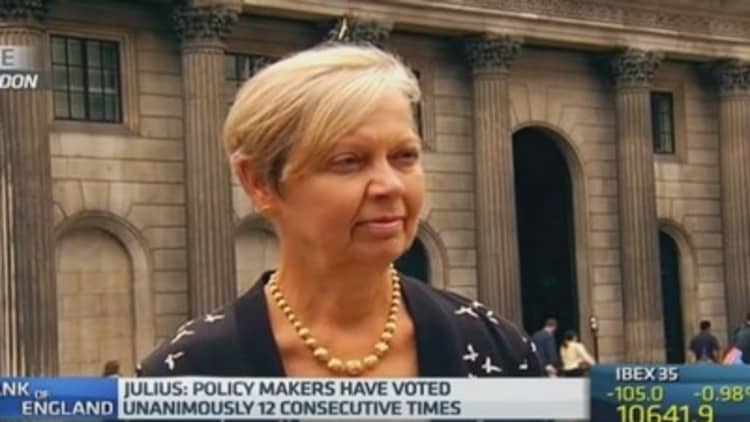The Bank of England (BoE) left interest rates and its asset purchase target unchanged on Thursday, amid concerns that a strong sterling could be choking off a recovery in the U.K. economy.
As expected, the bank decided to hold off on adding to the £375 billion ($628 billion) of asset purchases it has unleashed over previous years and kept its main benchmark rate at a record low of 0.5 percent. Despite not announcing any change in policy, the Old Lady of Threadneedle Street is poised for action in the not-too-distant future with BoE Deputy Governor Minouche Shafik saying on Wednesday that it's likely to lower its estimate of the spare capacity in the U.K.'s economy next month.
Such promising words have fueled yet more speculation that rates could rise, even at some point this year, which would benefit sterling with potentially more yield. The pound has soared this year in anticipation of such a move. In January it was trading at 1.6555 against the dollar but has recently ripped through the $1.70 level and was trading at $1.7119 on Thursday morning, seeing little change after the rate decision.
While a strong currency and bullish news that the U.K. economy is slowly returning to normal might be good for some, businesses have complained of pricing pressures. AB Foods, which owns retailer Primark, said Thursday that strengthening sterling was having "adverse effects" on its trading.
AB Food's ingredients division was particularly affected by the currency appreciation in the last quarter, the company noted, with reported revenues 5 percent lower than at the same period in 2013. It was a similar story at luxury brand Burberry. The U.K.-based retailer stated in an earnings release on Thursday that the pound's rise against most other major currencies had provided challenges for the group.
Both points of view were underlined by the John Longworth, the director general at the British Chambers of Commerce. He told CNBC Thursday that the Bank of England should hold off interest rate rises for as long as conceivably possible.
Read MoreElections, EU referendum top risks for UK firms
"(A rate rise) would be damaging to business in a number of ways," he said. "It'll take money out of the economy so consumers can't spend."

It would also choke off the U.K's export recovery, he added, and the cost of borrowing for businesses will go up, he said, meaning they might be more reluctant to borrow and spend on more expansion and investment projects.
Businesses might be voicing concerns about this continued move higher for the pound but in the currency markets in the City of London, traders are positioning themselves for what seems like the inevitable. Valentin Marinov, director of FX strategy at Citi, told CNBC Thursday that hit main investment call is to buy the pound.
Read MoreFive myths holding back UK growth
"It is still the strongest convection view," he said. "We got some disappointment earlier this week, manufacturing production was particularly disappointing but taken as a whole the bigger picture is still one where we would expect (the BoE) to move first."
"Correspondingly we'd expect the pound to do fairly well," he added, stating that he believed the euro would fall to 0.78 against the pound, from its current position of 0.7865 euros.


